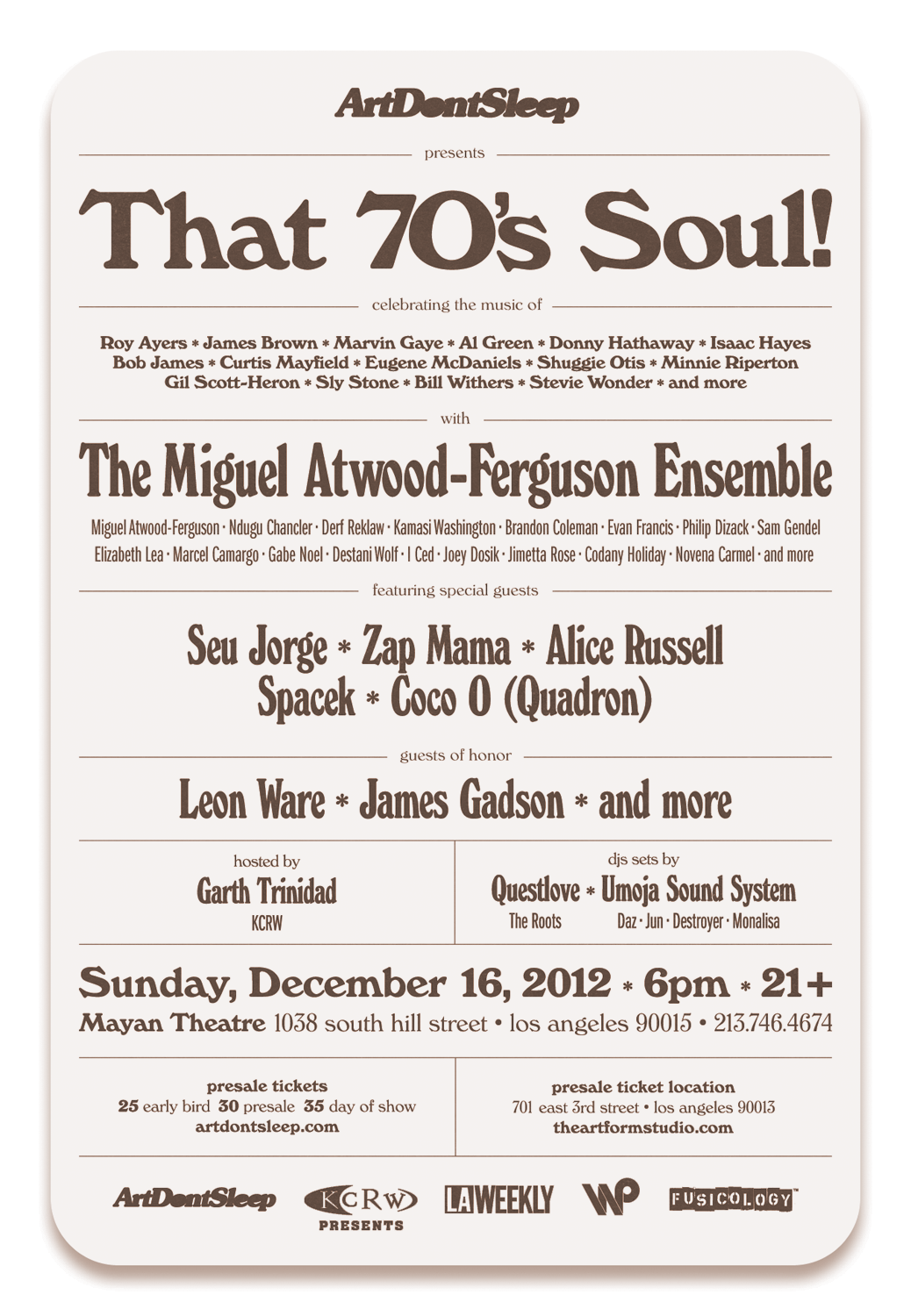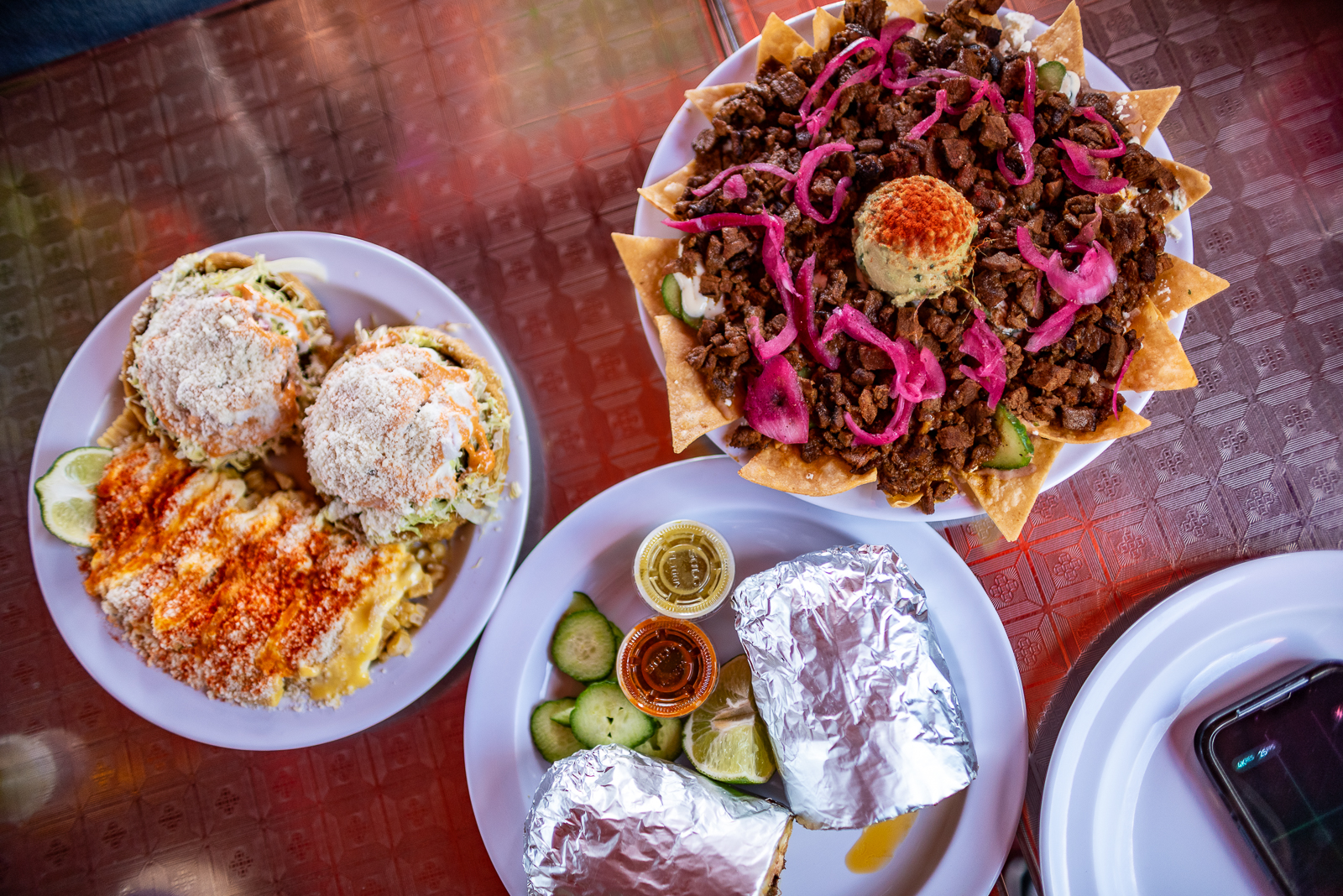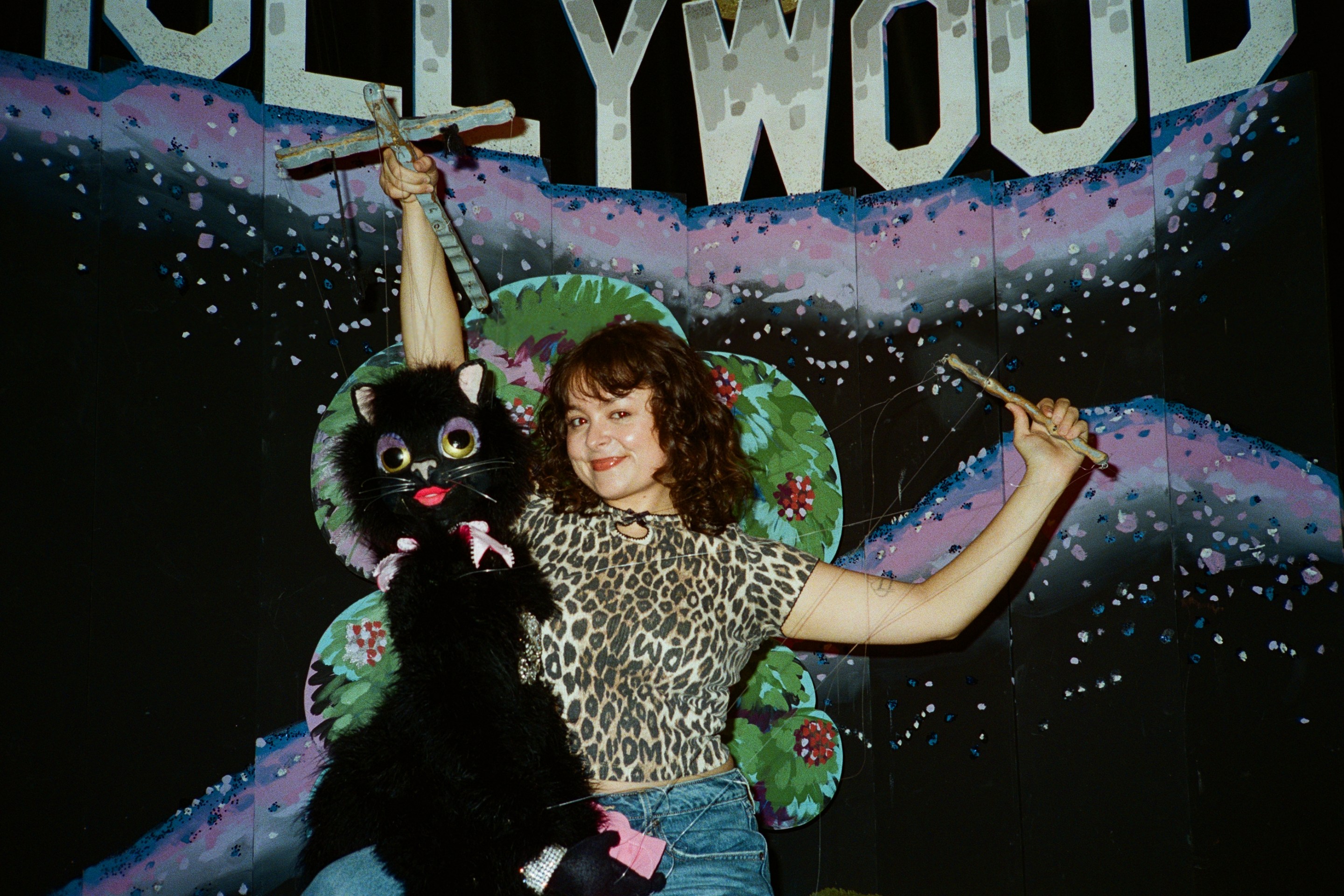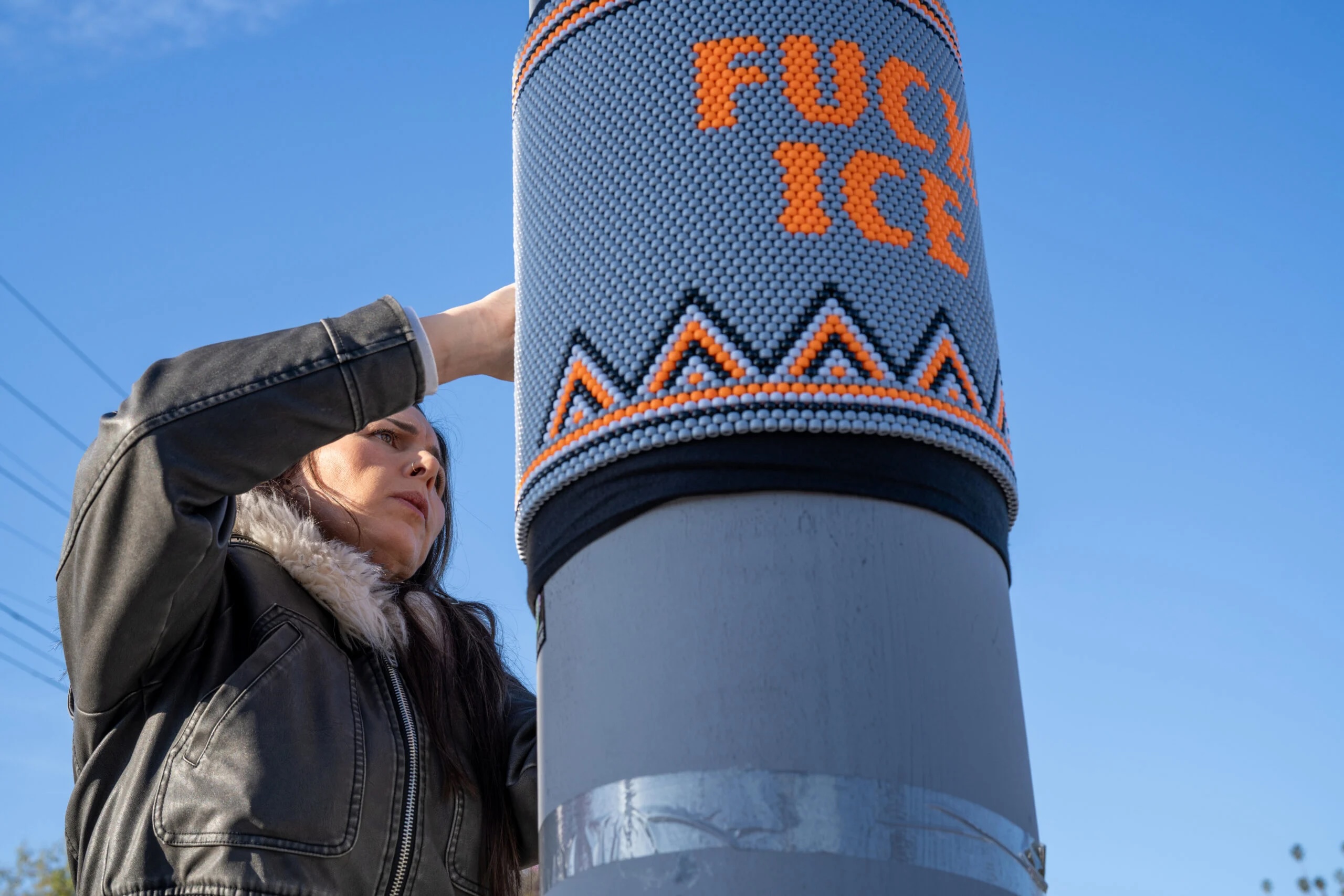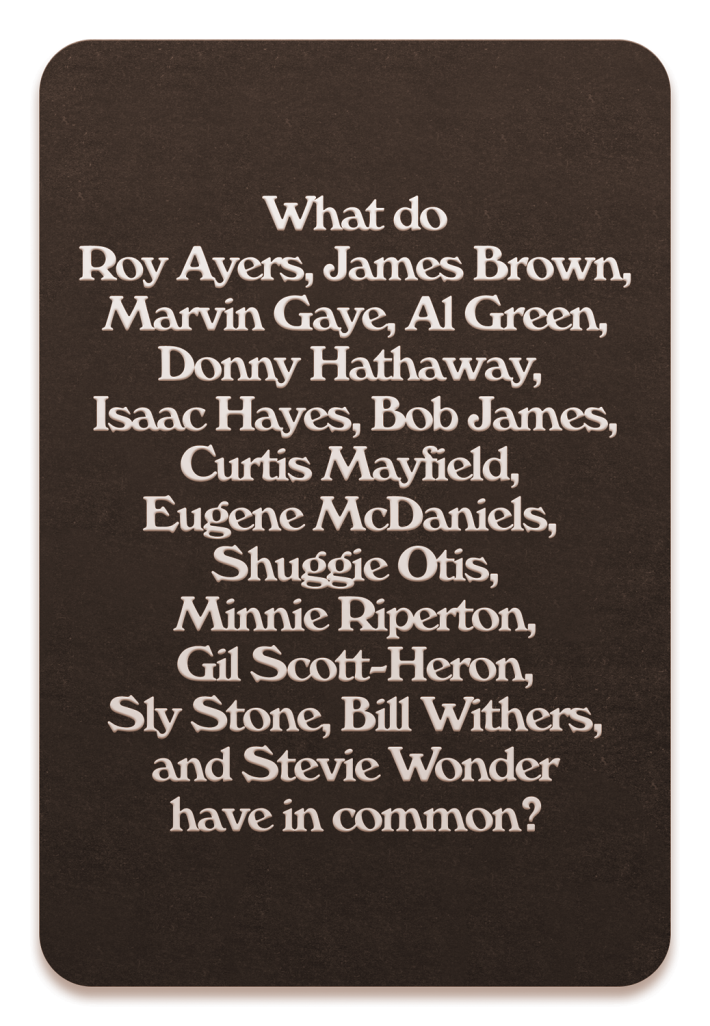
One of the coolest musical events of 2012 is happening on Sunday, December 16th. A mind-blowing list of performers and DJs will perform some of the best music ever made. Full details, videos, a mini-essay and more below...
Celebrating the music of:
Al Green, Bill Withers, Bob James, Curtis Mayfield, Donny Hathaway, Eugene McDaniels, Gil Scott-Heron, Isaac Hayes, James Brown, Marvin Gaye, Minnie Riperton, Roy Ayers, Shuggie Otis, Sly Stone, Stevie Wonder & More.
Performances by:
The Miguel Atwood-Ferguson Ensemble:
Miguel Atwood-Ferguson, Ndugu Chancler, Derf Reklaw, Kamasi Washington, Brandon Coleman, Evan Francis, Philip Dizack, Sam Gendel, Elizabeth Lea, Marcel Camargo, Gabe Noel, Destani Wolf, I Ced, Joey Dosik, Jimetta Rose, Codany Holiday, Novena Carmel & More.
Featuring Special Guests:
Seu Jorge
Zap Mama
Alice Russell
Spacek
Coco O. (Quadron)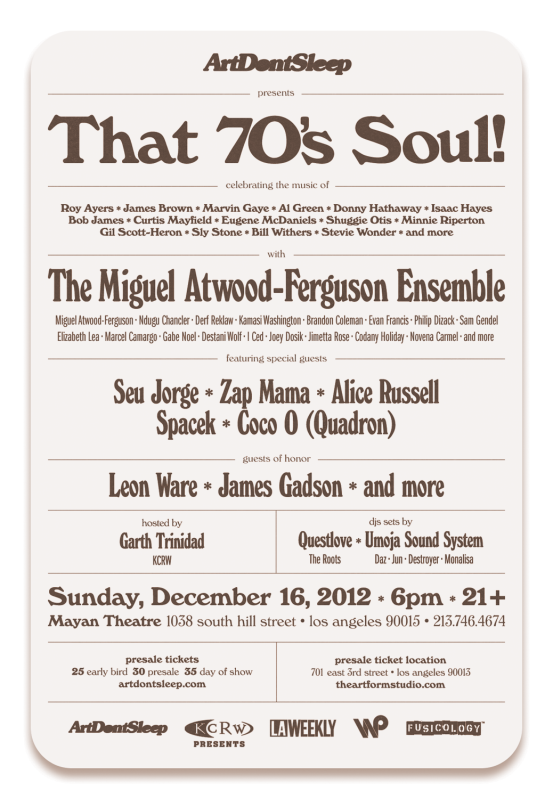
Guests of Honor:
Leon Ware, James Gadson, & More
Hosted By:
Garth Trinidad
DJ Sets by:
Questlove (The Roots)
&
The Umoja Sound System (Daz, Jun, Destroyer & Monalisa)
Promotional Partners:
KCRW, LA Weekly, Wax Poetics, Fusicology
Sunday 12/16/2012 :: 6pm :: 21 + Wiser
The Mayan Theater: 1038 South Hill Street, Los Angeles, CA., 90015, 213) 746-4674
Presale Tickets: www.ArtDontSleep.com
25$ Early Bird | 30$ Pre Sale | 35$ Day of Show
Presale Ticket Location: http://theartformstudio.com
701 E. 3rd St. Los Angeles, CA. 90013
213) 613-1050
That 70's Soul Playlist:
https://youtube.com/watch?v=playlist?list=PLXAmCl5l1pRqgiODcnpN6QIFA6XIpVWQ8&feature=view_all
Facebook:
http://www.facebook.com/events/404431069625368/
Dig Deeper, with words by Allen Thayer:
Soul music is timeless, but if there was one decade when it defined the times that would be the seventies. The style was born in the mid-sixties at a time when its creators were struggling to establish their place in American society. Sam Cooke, Lou Rawls, Solomon Burke, Curtis, Otis, Smokey, Marvin, James, Sly and Bobby Womack among countless others, sketched out a blueprint for a new, modern Black music that would soon sweep the nation from Harlem’s 125th street to rural Virginia’s Tobacco Road and as far as Watt’s 103rd street. Ironically, it took some Brits and Bob Dylan’s endorsement to hip whitestream America to what they were missing out on in their own blackyard. As the sixties turned into the seventies, and all but the Panthers deferred their dreams of racial revolution, soul music matured and flourished as if all the hopes, dreams, anger and disappointment of a generation of young Blacks found expression in the music of Stevie, Curtis, Marvin and Minnie.
We almost lost Detroit, but from this and many other cities’ ashes emerged a beautiful and bold music – a more personal, and therefore universal, expression – that evolved into one of the most dominant culture expressions of the decade. By the dawn of the seventies, soul music was mainstreaming with the crossover success of artists like Stevie Wonder, Bill Wither, Marvin Gaye, Isaac Hayes, Minnie Riperton, Al Green and Michael Jackson. Just about everyone was getting in on the new trend of socially conscious lyrics, fatback drums and stop-on-a-dime horn sections. The popular and critical response to this music blew open the doors for a whole family of styles. Soul music was appropriated and incorporated into just about every other genre imaginable: soul-jazz, soul-rock, psychedelic soul, latin soul, and blue-eyed soul are just a few of the more popular hybrids.
And then there’s Funk. Like Metal is to Rock ‘n Roll, Funk is an extreme manifestation of Soul music that emerged in the late sixties and early seventies from the bold rhythmic experiments of Soul music’s pioneers like James, Sly, Curtis & Stevie. Soul music was the foundation and Funk was the attitude, the secret spice to get the people moving and it was applied liberally to songs by new and established artists alike. Some musicians, like Parliament-Funkadelic founder George Clinton, started their careers in the sixties singing Soul, but after Sly and James took their music to faster, funkier and blacker places, they followed headlong into uncharted funkmospheres, further expanding the sonic, social and sexual boundaries of Soul music. Herbie and his Headhunters, Donald Byrd, Roy Ayers to name but a few respected jazz musicians were helpless against this powerful new sound, giving us jazz-funk.
Sadly, America’s soul obsession wouldn’t last forever. Like a salesperson that didn’t understand its product or consumer, the music industry forced the soul into extinction by forcing it into platform boogie shoes and a rigid 4-4 dance beat. Some survived, but most artists’ careers tanked or they were forced to radically change their game. Forty years later, soul music is more popular than it’s been for decades with new talent and audiences gravitating to its sincere sentiment, heartfelt harmonies, and bad-ass beats.
ArtDontSleep will bring over two dozens timeless tunes and hi-fi highlights from 1970-1979 to life for one night only with That 70s Soul featuring Seu Jorge, Zap Mama, Alice Russell, Spacek, Coco O. (Quadron) and others. An all-star cast of musicians, including legends Ndugu Chancler and Derf Reklaw along with future legend Kamasi Washington, lead by multi-instrumentalist and arranger/composer Miguel Atwood-Ferguson will breathe new life into these seventies soul masterpieces. These are many of the same creative and fearless musicians and promoters that brought you the recent East Side Story Show as well as the 2009 Timeless series featuring the music of J. Dilla, Mulatu Astake and Arthur Verocai.
On this special night some of the under-sung musical heroes that are still alive and with us today, like Leon Ware, James Gadson and others be honored through their music and presence.
Leon Ware is best known for the songs he’s written, Marvin Gaye’s “I Want You”, Quincy Jones or Average White Band’s “If I Ever Lose This Heaven” or Minnie Riperton’s “Inside My Love”, though he has no fewer than ten albums recorded under his own name for Motown, Elektra and most recently for the revived Stax record label. His sophisticated and sensual style of soul helped to define the influential quiet storm style.
James Gadson is a living legend behind a drum kit. He’s played behind everyone from Bill Withers and Charles Wright and the 103rd Street Band to Justin Timberlake and Norah Jones, with Marvin Gaye, Aretha Franklin and countless others along the way. Far from a one-trick pony, he’s also written, produced and sang on hundreds of records from the Doo-Wop era to the present day.
